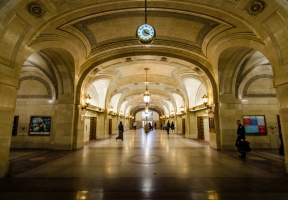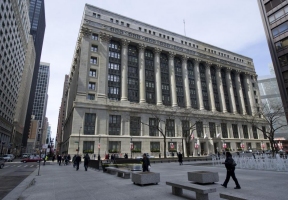

The City of Chicago, along with various City Departments and agencies, is informing Chicago residents, workers and visitors of major new local laws and regulations that will come into effect in 2020. These new laws include: regulations for ensuring safe and responsible implementation of adult-use cannabis; first steps to address Chicago’s downtown congestion; the implementation of important protections for Chicago’s workers; process improvements to support small business owners; and more. The following new laws will come into effect in 2020:
Legalization of Adult Use Cannabis
Starting January 1, 2020, adult-use cannabis will be legal throughout the State of Illinois. Recreational cannabis will be available for purchase by individuals 21 years of age and older at State-licensed dispensaries, with zoning requirements in place to ensure equal distribution of dispensaries across the City. Mayor Lightfoot has also launched the Cannabis Facts Chicago program to provide cannabis health and safety tips for all Chicagoans and has proposed a Cannabis Consumption License to allow for safe, designated consumption sites. Additionally, the passage of the Cannabis Retailers’ Occupation Tax ordinance, which will impose a three percent tax on all cannabis retailers in the City, will go into effect on January 1st.
Congestion Tax
To address rampant congestion downtown and encourage sustainable shared rides throughout the City, Mayor Lightfoot’s landmark congestion tax will go into effect in 2020. This new tax structure will address the significant role played by the growth of ride-hailing services in the congestion plaguing Chicago. Beginning on January 6th, the tax for all trips on Transportation Network Providers (Uber, Lyft or Via) will change, from $0.72 per trip to $1.25 for a single trip and $0.65 for a shared trip. Trips in the downtown area during weekdays from 6:00 am to 10:00 pm, when other transportation options are plentiful, will see an additional downtown surcharge of $1.75 per trip for single rides and $0.60 per trip for shared rides.
Restaurant Tax
Beginning in January 2020, the City will impose a modest restaurant tax increase on all food and beverages sold at retail establishments, putting Chicago on par with neighboring cities. The current tax of .25 percent will increase by an additional .25 percent to .50 percent. The increase will put Chicago on par with or below the restaurant tax assessed at neighboring suburbs, and is expected to generate an additional $20 million in 2020 and on an ongoing annual basis. The amended tax rate reflects the first increase since the tax was implemented in 2004.
Parking Meters
Also beginning on January 1, new parking meter fees will be enacted following City Council approval earlier this year. The new fee rate structure will call for a 50 cent increase in the downtown area, as well as changes in the West Loop including the installation of new parking meters and a rate increase from $2 per hour to $4.50 per hour to align with rates throughout the downtown area. These increases are consistent with the Congestion Tax Zone for ride-hailing fees and are designed to reduce “true up” obligations to the parking meter operator.
Fast Track Signs
Starting March 1, 2020, the Fast-Track Business Sign Program will remove barriers to obtaining a sign permit by allowing businesses to apply for a basic on premise sign at the same time as their business license. This will eliminate a complicated procedure and expedite the process for business owners to obtain certain sign permits from several months to the day they get a business license.
Utility Billing Relief Pilot Program
The new Utility Billing Relief Pilot Program will launch on April 1, 2020, offering owners of a single family or two-unit residents who are eligible to participate in the Low Income Home Energy Assistance Program (LIHEAP) to reduce the cost of water and sewer service, and to pay off any outstanding debt in an affordable way. For more information on how to qualify for the Billing Relief Program and other debt relief reform programs enacted by Mayor Lightfoot, residents are encouraged to visit www.chicago.gov/newstartchicago
Fair Workweek
Chicago’s workers will for the first time receive the benefits of a predictable schedule starting July 1, 2020. Mayor Lightfoot’s landmark and expansive legislation will provide relief to hundreds of thousands of workers by ensuring fair scheduling policies for workers in the following industries: Building Services; Healthcare; Hotels; Manufacturing; Restaurants; Retail; and Warehouse Services. Starting July 1, employees earning no more than $26/hour or $50,000/year for an employer in those industries with more than 100 employees (250 for a non-profit or restaurant) will be covered by the ordinance.
Minimum Wage
On July 1, 2020, hundreds of thousands of Chicagoans will get a raise. On that day, Chicago’s minimum wage will increase to $14 an hour, reaching $15 an hour by 2021, four years before the State of Illinois. Furthermore, Mayor Lightfoot’s Minimum Wage Ordinance will extend minimum wage protections to numerous groups that were previously exempt. Beginning July 1, 2020, youth under the age of 18 and employees in “Learners” and Subsidized Transition Employment Programs will be covered for the first time, receiving a raise to $10 an hour on the path to $15 an hour by 2024. Also on July 1, the minimum wage for tipped workers will increase to $8.40 an hour, 60 percent of the minimum wage.











